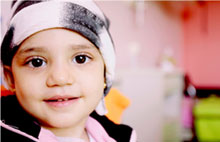 Four-year old Fatima was diagnosed with carcinoma eight months ago. She used to receive treatment at Aleppo University Hospital, but the ongoing fighting in the city forced her family to flee their home town and relocate to Jaramana, near Damascus.
Four-year old Fatima was diagnosed with carcinoma eight months ago. She used to receive treatment at Aleppo University Hospital, but the ongoing fighting in the city forced her family to flee their home town and relocate to Jaramana, near Damascus.
10 March 2013 – After almost two years of conflict, accessing life-saving treatment in Syria is becoming increasingly difficult due to severe shortage of essential medicines.
Four-year old Fatima was diagnosed with carcinoma eight months ago. She used to receive treatment at Aleppo University Hospital, but the ongoing fighting in the city forced Fatima, her mother, brother and two sisters to flee their home town and relocate to Jaramana, near Damascus. “My daughter used to be treated with radioiodine, but the medication is no longer available in Aleppo.” Her mother Zakia said. “Here [in Damascus] we regularly go to al-Assad Hospital but they don’t have the medication either. They said they don’t have the required materials. I don’t know what that means! I just want Fatima to receive her treatment.” If Fatima does not receive her radioiodine treatment soon, her chances of surviving cancer will be in danger.
Fatima’s father currently works in a bakery in Lebanon, earning US$ 600 per month. Zakia noted that “We cannot afford going to Lebanon to get the medication. We don’t have a place to stay and the hospitals are extremely expensive there.”
In Syria, cancer is a national public health problem and the incidence of the disease is rapidly increasing. In 2009, cancer was ranked third among the 10 leading diseases of mortality in the country, and according to the 2009 statistics of the cancer registry of the Ministry of Health, more than 1600 children were diagnosed with cancer. An additional 2500–3000 children are expected to be diagnosed with cancer in 2013.
Almost 90% of the country’s medicines and medical supplies were locally produced at pharmaceutical plants in Aleppo, Rural Damascus and Homs governorates before the onset of the crisis. However, most of these plants are no longer functioning. The importing of other medications, including those for cancer, is being hampered by economic sanctions, difficulties in bank transactions, currency fluctuations, a decrease in the allocated budget for the Ministry of Health, and the damage done to hospitals and medical facilities. To date, 57% of public hospitals have been damaged, 36% are out of service and 21% are partially damaged. Functioning hospitals and private sector facilities are often overwhelmed with patients and suffer from severe shortage in medicines, putting the lives of patients like Fatima in grave danger.
“I don’t know what I have to do! She is getting worse by the day... I don’t want to lose her,” Fatima’s mother exclaims. “We have not been able to secure her medications for months… This situation is unbearable.”




